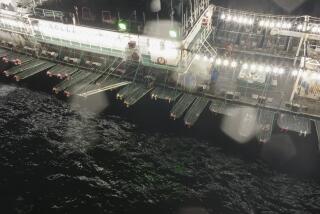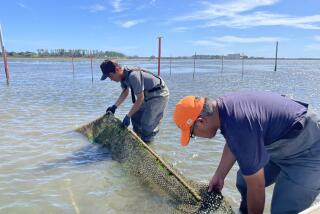Nation Loses Taste for Fish
- Share via
COLOMBO, Sri Lanka — Keerthi Munasinghe, a robust lover of seafood, said he scarcely could have imagined a day when he would sit down to cocktails of powerful coconut arrack without nibbling a side dish of spicy deviled fish.
“Always, I would eat fish with my drink,” he said.
But ever since a series of tsunami waves roared onto the coast of this island nation, killing more than 30,000 people and dragging many bodies out to sea, the 42-year-old said he’d eliminated seafood from his diet.
Like millions of his fellow Sri Lankans, Munasinghe has sworn off the staple since the Dec. 26 disaster, believing that Indian Ocean sea creatures have feasted on those who were swept out to sea.
“I love fish, but it will be some time before I eat it again,” he said. “In my village we had three people who went into the sea. One by one they had washed up on the shore and they had bites on them from fish.”
The morbid and unanticipated consequence of the disaster has devastated a fishing industry already ravaged by physical damage to boats and shorelines.
A delegation of fishermen recently carried a crate of fish to the presidential palace, hoisted it onto the table during a Cabinet meeting and begged officials to eat the contents.
Already, seafood prices have plummeted, while chicken has grown increasingly scarce as Sri Lankans search for fish substitutes.
Adding to the problem, a rash of cellphone text messages in the capital has claimed that fish have been contaminated with a fictitious corpse-borne virus.
Even before the fishermen visited the palace, the government was waging a campaign to encourage Sri Lankans to eat seafood again, without much success.
“Scientifically, there’s nothing to prove that fish caught after the tsunami cannot be consumed,” Health Minister Nimal Siripala de Silva said. “It’s only a psychological myth that I’m sure will pass with time.”
On Saturday, World Health Organization Director-General Lee Jong-wook visited Colombo and held a news conference announcing that it was safe to eat fish.
“Since I have arrived in Sri Lanka I have only been eating fish,” he said.
But such appeals to reason have had little effect on erstwhile fish eaters.
“I am not worried that it will make me sick,” said Wickrama Arachchige Prassana Ajith, driver of one of Colombo’s many three-wheeled cabs.
“The problem is in my head. I do not eat fish now because when I do, I’m thinking of the people being eaten.”
At the cavernous Pettah fish market in Colombo, a welter of tile and concrete bays echoed with the voices of fish sellers peddling squid, tuna, prawns, mackerel, crab, lobster and other fare. Fish sellers complained that prices had dropped 50%. They said that fishermen who still had boats were finding little incentive to return to the water.
“People tell lies. Fish good!” said Vejaytunga Vilfret.
Beside him, another seller, Emke Sunil, arranged portions of tuna and mackerel on a wooden crate. Under one slice of tail, Sunil tucked a pair of coins.
“That’s for luck,” he told a reporter. “I haven’t had much yet.”
More to Read
Sign up for Essential California
The most important California stories and recommendations in your inbox every morning.
You may occasionally receive promotional content from the Los Angeles Times.














